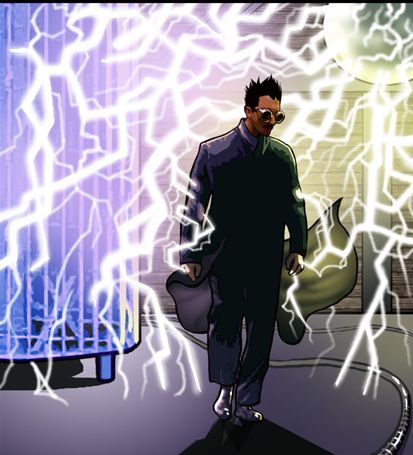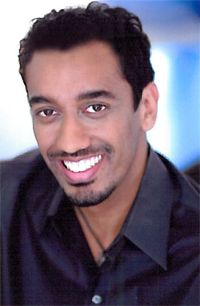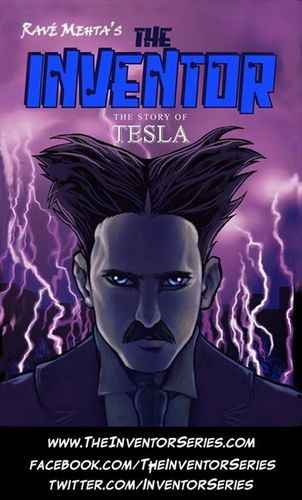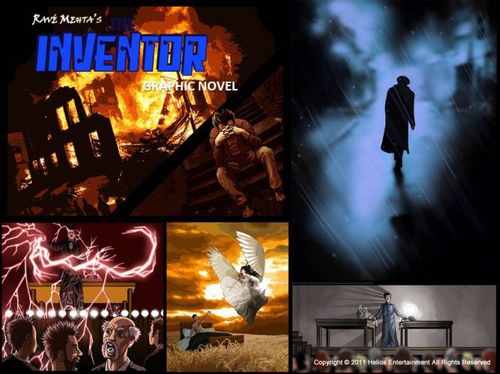A Conversation With Ravé Mehta At Comic-Con
Mike Ragogna: So just who is this Tesla dude and why is he important to us, although we kind of know a little bit already but pretend we don't?
Ravé Mehta: Nikola Tesla is a Serbian immigrant who came to America in late 1884 as an engineer who went to work for Thomas Edison. Later, Tesla's inventions were so progressive that he catalyzed the second industrial revolution and gave birth to The Electrical Era. In short, many of Tesla's inventions set the foundation for the 20th century, such as electricity to power our homes, radio, remote control, robotics, and wireless technology like our phones and many other things we take for granted today. He was even conceiving more esoteric stuff such as a "dream recorder." Tesla is one of those prolific and mystical inventors that slipped through the cracks of time.
MR: How come Tesla became so important to you? What inspired you to research and write about him?
RM: You know me as a really passionate music composer and producer, but behind all that, I'm also a total technology nerd. (laughs) About 4 years ago, after I was appointed to the Space Florida Board of Directors--the Florida Space Agency--I was researching various programs around gravity we could implement into our new Stephen Hawkins Micro-Gravity Research Center. During that time, I kept running into Tesla's theories and research, which really resonated with me given my engineering and tech background. However, what I really connected with was Tesla's life--the human behind the genius.
Tesla was the ultimate underdog. He came to this country in 1884 with a few dollars and a dream. For whatever reason, his ideas were so progressive that he managed to get a whole bunch of rich and powerful people--Thomas Edison, JP Morgan, Marconi, etc.--so upset that they did everything they could to shut him down. Yet, despite the material, emotional and spiritual battles Tesla faced, he still fulfilled his destiny and changed the world. My graphic novel, The Inventor: The Story Of Tesla, is really a story about the human spirit. It's the journey of every aspiring artist and musician and entrepreneur out there, including myself, which is why I wrote it, to inspire others to have that "inventor spirit" in whatever they do.
MR: Can you go into what your graphic novel covers on the life of Tesla?
RM: The Inventor is based on the true story of Nikola Tesla, from his epic birth in the middle of a lightning storm to after he arrives to America where his greatest mentor, Thomas Edison, turns into his most resolute adversary and wages a War of the Currents on Tesla. The finale is where JP Morgan, who I refer to as the ultimate capitalist, pulls the plug on the Wardenclyffe Tower project, Tesla's attempt to give free and abundant energy to the world. At its essence, The Inventor is an inspirational story of how the human spirit can lead to triumph and human ego can lead to disaster.
MR: What was the behind the scenes battle between Tesla and Edison ultimately about, you know, The Current Wars?
RM: The Current Wars was really the battle between who's technology, Tesla's Alternating Current (AC) or Edison's Direct Current (DC) technology would power the planet. But deeper than that, it was a battle between the human spirit and the human ego. Edison was considered the father of electricity and he didn't want to lose that foothold, so he did everything he could to make Tesla's AC technology look dangerous. At first, he held public showings where he would electrocute cats, dogs, and later an elephant named Topsy at Coney Island in front of 2,000 people. Edison also had a major hand in the creation of the electric chair for human electrocution using Tesla's AC motor, all as a negative PR stunt to scare people away from Tesla's technology. In the end, Tesla's AC technology is what's used to power the grid and the planet, while Edison's DC technology is what's used to power consumer electronics like your blender. The irony in all of this is Tesla offered his AC technology to Edison first, but Edison turned it down.
MR: Why aren't most people aware of Nikola Tesla and his history?
RM: I'm surprised at that also. I never read about Tesla in my school books when I was a kid. All I can say here is Tesla really picked some pretty powerful guys to go head-to-head with. I mean, Thomas Edison was the founder of General Electric, one of the largest corporations in the world today, and at the time, JP Morgan was the most powerful banker in the US--his company today known as JP Morgan Chase--and actually saved the US Treasury from collapsing in 1907 and later helped create the Federal Reserve. Talk about influence. There's a great dialog at the end of the book where JP Morgan tells Tesla, "Marconi will be the creator of the radio and you, Tesla, will be nothing but a footnote."
MR: Sadly, he was kind of right. Did Tesla have any inventions that contributed to today's music industry?
RM: Aside from being the father of modern electrical era, Tesla is also recognized as the father of the radio. He held the original radio patents and concept, which the courts later granted to Guglielmo Marconi after Tesla's falling out with JP Morgan. It wasn't until a few months after Tesla's death in 1943 and after Marconi won the Nobel Prize for the Radio that the courts reverted the patents back to Tesla declaring him as the original creator of the radio, which later became a fundamental pillar for the music industry. Tesla also created the foundation for electronic music today through his research into oscillator waves, frequency modulation and his oscillator devices. We producers and engineers are always manipulating LFOs, oscillators, wave forms, etc., to make cool new sounds and synths.
MR: And what was his impact beyond that?
RM: Beyond his inventions, Tesla had a huge impact on musicians. There's the hard rock band Tesla who really stayed true to their namesake by naming their albums and songs after events in Tesla's life: The Great Radio Controversy, Edison's Medicine, etc. The band AC/DC was named after the battle between Tesla's alternating current (AC) and Edison's direct current (DC). Then there's David Bowie who played Tesla's character in the movie Prestige, which I really loved. The coolest thing I've seen was in the movie The Sorcerer's Apprentice where the young geeky apprentice used these huge Tesla coils to play the song "Secrets" by Coldplay, just to impress a girl. Ha, that's totally something I would do!

MR: In honor of your releasing this at Comic-Con, what would you say is Tesla's super power?
RM: Funny you ask that, I wrote this story with that in mind. In fact, that's it--his mind! Tesla would observe things in nature and use his imagination to visualize and assemble an invention completely in his head in 3D space and simulate it until he worked out all the kinks in the system before he put one thing down on paper, kind of like what Robert Downey Jr. does in Sherlock Holmes before he starts beating up on a group of people. In the game that we're developing around the story, Tesla learns to control electricity and magnetism over time, so he would shoot electricity out of his hands, levitate objects out of the way, and, of course, blow things up. I think that could place Tesla as Magneto's granddaddy or perhaps a long time ago in a galaxy far, far away, he would make an excellent Jedi who likes to listen to some sick dubstep.
MR: Who do you think is the audience for The Inventor?
RM: That's a good question. I would say techies, gamers, geek culture enthusiasts, musicians, and artists, but then I gave a copy to my dad the other day, who's none of these, and he was inspired by it. So I would say anyone who wants to be empowered by the belief that they can do the anything, like change the world with nothing but their mind, passion and perseverance. Also we're really looking to drive a strong educational platform to empower kids to re-engage math and science through the arts.
MR: Who was your visual artist?
RM: I got lucky there. I met my artist Erik Williams through complete synchronicity. I put an artist call out for this book and after talking to a few talented artists, I came across Erik who was also talented but really passionate about Tesla's story and always wanted to do a book on him. I knew after our first conversation I had the right guy. I mean, our minds were completely sync'd up, just like when I'm producing a really cool artist I really vibe with.
RM: Where can someone get the book?
RM: Our publisher, Arcana Comics, set the official worldwide public release date for bookstores, Amazon, etc., for late October, but we're selling a limited amount of pre-release copies of the full book at Comic-Con this week. For those who can't make it to Comic-Con, the first 500 people can buy it from https://www.TheInventorSeries.com and have it shipped to them. People can also follow us to get the latest updates, giveaway contests, etc. on https://www.facebook.com/theinventorseries or @inventorseries and @ravemehta.
MR: What's your plan for The Inventor after Comic-Con?
RM: The Inventor is really a series on contemporary and mystical inventors in the 19th and 20th centuries that changed the world starting with Tesla. The goal is to inspire children and adults to create, innovate and aspire to be future inventors. That being said, we're looking to extend the story into a film, game, apps, live show, and other mediums. My team and I designed The Inventor from the beginning to be a full transmedia property.
MR: So might there be any interest from movie studios?
RM: I think so. There's such a ground swell of interest in Tesla all of a sudden, that I think The Inventor would make an excellent film or even a great TV show, which is why I originally wrote the screenplay before I wrote the graphic novel.
MR: Is there any musical component to this?
RM: Absolutely. A huge one. As you can tell, there are some powerful themes in the story, which naturally inspired me and my sister Radha Mehta, who's also an amazing singer-songwriter, to write some cool tracks for a new album I'm producing under the name Renaiszance. We're also going to do some interesting crowdsourcing projects around this theme to engage a community of writers, artists, musicians and producers to contribute to the larger ...Inventor world. And there are so many Tesla fans out there who have some amazing innovative ideas so we're always keeping our antennas up for new ideas and ways of engaging people.
MR: How do you envision a conversation between Tesla and Skrillex going?
RM: To start, I think Tesla would make a sick DJ, because Tesla was a true showman. In The Inventor, there's a part of the story that illustrates how Tesla lit up the Chicago's World Fair turning night into day for the first time in history. Later that evening, he demonstrated to the President and the world's elite how his alternating current technology worked by making a metallic egg levitate in front of an audience--and this was back in 1893! I love Skrillex, so to be a fly on the wall for a conversation between him and Tesla probably would be something like this...
Skrillex: Hey man, I know you're kind of old, but I need to make some fresh new sounds for my upcoming show. Any ideas?
Tesla: Mr. Skrillex, if we throw a couple of my Tesla coils up on stage and program their electrical frequencies to the diatonic scale in your music while levitating you across the stage, I think we can take dubstep to a whole other level.
Skrillex: Whoa, dude your sick...can you help me design my new synth?
MR: And what advice might you and Tesla have for new artists?
RM: I think Tesla would have the same advice I have. Dig down deep and find out who you really are and let your music flow from there. So many people seem to be chasing what they think is hot now, but ultimately, music is supposed to be one of the most honest expressions of your authentic self, so if it's not coming from there, it will be much harder for people to really connect with it and for it to persist through the waves of time. I think Tesla would add that throwing some electronic synths in there wouldn't hurt anyone.
MR: Last question: What's your favorite quote?
RM: Hmmm. I would have to say it's something Deepak Chopra once told me when we're having dinner a few years ago. "It's not the ghost that's in the machine, it's the machine that's in the ghost." You'll have to read my book to find out what that means.
MR: Nice. Thanks Ravé for your time, all the best with everything Tesla.
RM: Thanks Mike.



